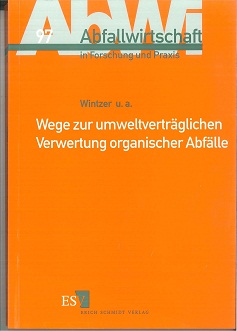Paths to an environmentally sound utilization of organic waste
- Project team:
Wintzer, Detlev (Project leader), Ludwig Leible, Christine Rösch, Rainer Bräutigam, Beate Fürniß, Gerhard Sardemann
- Funding:
Deutsche Bundesstiftung Umwelt (DBU)
- Start date:
1993
- End date:
1996
- Research group:
Sustainability and environment; Energy - resources, technologies, systems
Project description
The question as to an environmentally sound utilization of organic residues and waste is closely tied to the topic of renewable resources. The object in both cases is material of plant origin. And in both cases, energetic and none energetic types of utilization come into consideration in which similar technical, economic, and ecological perspectives play a role when assessing alternatives.
This study funded by the Deutsche Bundesstiftung Umwelt (DBU, German federal environmental foundation) was completed in 1995 and published in book form in 1996.
The study examined in detail 11 types of organic waste and overall 16 processes for thermal and biological treatment. For technical reasons, not all treatment procedures can be used with each type of waste. The feature that primarily determines whether a treatment procedure is technically suitable is the concentration in the waste of water, nitrogen, and organic substances that can be easily degraded biologically as well as the physical consistency of the waste or residues. Otherwise important for the environmental soundness of how different types of organic waste are dealt with is the amount of wood-like material, plant nutrients, heavy metals, long-lasting organic pollutants, olfactory substances, and germs that the waste contains. This study gathers numerous quantitative specifics on the concentration of these substances in different types of waste. This very diverse composition made it sensible first to determine which different treatment procedures are advantageous or disadvantageous for which type of environmental benefit or damage (and thus also for which substance).
One result of this study's analyses is that concrete situations occur more frequently in which the environmental advantages of thermal processing outweigh those of the processes of fermentation and composting. The increasing competition between the different processes has led to a reduction in the costs of thermal treatment in the last few years. At the same time, the costs of modern technologies for biological treatment have risen due to an increase in the standards for environmental protection. Nonetheless, thermal treatment processes are as a rule more expensive than biological ones.
The current situation (base year 1995) provides reason to reexamine whether the strategic preference for the biological procedure in decisions on waste policy that exists in many of the German Federal States is in need of correction. We naturally have to take into account that the ecological assessment of the biological procedures depends on where the compost is applied and that there may be legal differences between these locations. The application of compost to agricultural land is subject to greater restrictions than is, for example, the recultivation of devastated areas. From a long-term ecological perspective, however, the application of large amounts of compost is not unobjectionable for all types of compost.
Selected publication
Wintzer, D.; Leible, L.; Rösch, Ch.; Bräutigam, K.R.; Fürniß, B.; Sardemann, G.
Wege zur umweltverträglichen Verwertung organischer Abfälle. Berlin: Erich Schmidt 1996
(Schriftenreihe "Abfallwirtschaft in Forschung und Praxis")
Titelbild/jpg
Publications
Environmentally compatible treatment and use of organic waste
1998. Institute for Prospective Technological Studies IPTS [Hrsg.] The IPTS Report 22, March 98, 17–24
Nutzung von nachwachsenden Rohstoffen und organischen Abfällen - ein Beitrag der Landwirtschaft zur Nachhaltigkeit
1997. Stoff- und Energiebilanzen in der Landwirtschaft. Hrsg.: Verband Deutscher Landwirtschaftlicher Untersuchungs- und Forschungsanstalten, 459–462, VDLUFA
Systemanalytische Untersuchungen zur umweltverträglichen Behandlung und Verwertung organischer Abfälle
1997. Nachrichten - Forschungszentrum Karlsruhe, 29, 113–22
Wege zur umweltverträglichen Verwertung organischer Abfälle
1996. Berlin : Erich Schmidt Verl., 1996 (Abfallwirtschaft in Forschung und Praxis ; 97)
Umweltverträgliche Verwertung organischer Abfälle
1995. Technikfolgenabschätzung, Theorie und Praxis, 4 (4), 30–34. doi:10.14512/tatup.4.4.30


